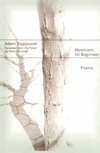
Mysticism for Beginners
By Adam Zagajewski
If I had to choose between the daily newspaper and poetry, I would forgo the Times, because the great poets—and in this group I certainly count Adam Zagajewski, along with Seamus Heaney, Anne Carson, and Czeslaw Milosz—deliver essential and eternal news, usually in the form of questions. They nudge us to challenge ourselves about how we are spending our one life. A Polish poet now living in Paris and Houston, Zagajewski writes modest, frank meditations that approach contemporary prayer. In a poem called "Moment," he distills happiness, always the hardest emotional coloration to find arrested on the printed page:
We went out. The pale sun shone,
tinny music tinkled softly
from a car, two jays
studied us, humans,
threads of longing dangled in the air.…
This moment, mortal as you or I,
was full of boundless, senseless,
silly joy, as if it knew
something we didn't.
By Adam Zagajewski
If I had to choose between the daily newspaper and poetry, I would forgo the Times, because the great poets—and in this group I certainly count Adam Zagajewski, along with Seamus Heaney, Anne Carson, and Czeslaw Milosz—deliver essential and eternal news, usually in the form of questions. They nudge us to challenge ourselves about how we are spending our one life. A Polish poet now living in Paris and Houston, Zagajewski writes modest, frank meditations that approach contemporary prayer. In a poem called "Moment," he distills happiness, always the hardest emotional coloration to find arrested on the printed page:
We went out. The pale sun shone,
tinny music tinkled softly
from a car, two jays
studied us, humans,
threads of longing dangled in the air.…
This moment, mortal as you or I,
was full of boundless, senseless,
silly joy, as if it knew
something we didn't.
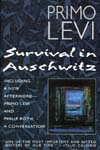
Survival in Auschwitz and The Reawakening
By Primo Levi
These two short works survive as the greatest art to emerge from the preeminent human tragedy of the 20th century. The accounts of Levi's time in Auschwitz and of his legendary journey after the liberation from Auschwitz back home to Italy, through Russia, are full of psychological insight, brilliance, sorrow, laughter, and improbable joy. Here is his description of a child born in the camps: "Hurbinek was a nobody, a child of death, a child of Auschwitz... Hurbinek, who was three years old and perhaps had been born in Auschwitz and had never seen a tree; Hurbinek, who had fought like a man, to the last breath, to gain his entry into the world of men, from which a bestial power had excluded him; Hurbinek, the nameless, whose tiny forearm—even his—bore the tattoo of Auschwitz; Hurbinek died in the first days of March 1945, free but not redeemed. Nothing remains of him: He bears witness through these words of mine." In his afterword to The Reawakening, Levi wrote: "A friend of mine, who was deported to the women's camp of Ravensbrück, says that the camp was her university. I think I can say the same thing." And his work is ours.
By Primo Levi
These two short works survive as the greatest art to emerge from the preeminent human tragedy of the 20th century. The accounts of Levi's time in Auschwitz and of his legendary journey after the liberation from Auschwitz back home to Italy, through Russia, are full of psychological insight, brilliance, sorrow, laughter, and improbable joy. Here is his description of a child born in the camps: "Hurbinek was a nobody, a child of death, a child of Auschwitz... Hurbinek, who was three years old and perhaps had been born in Auschwitz and had never seen a tree; Hurbinek, who had fought like a man, to the last breath, to gain his entry into the world of men, from which a bestial power had excluded him; Hurbinek, the nameless, whose tiny forearm—even his—bore the tattoo of Auschwitz; Hurbinek died in the first days of March 1945, free but not redeemed. Nothing remains of him: He bears witness through these words of mine." In his afterword to The Reawakening, Levi wrote: "A friend of mine, who was deported to the women's camp of Ravensbrück, says that the camp was her university. I think I can say the same thing." And his work is ours.
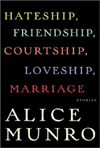
Hateship, Friendship, Courtship, Loveship and Marriage
By Alice Munro
Whole lives are chronicled in the tales of Alice Munro—dramas worthy of Shakespeare's princes and Tolstoy's debutantes somehow fit into 30 pages. Munro understands love, she understands class and old age. Her stories in this new collection are wildly exhilarating while credibly modern. She has captured the range and depth of female experience in ways that no one, in any language, has ever done before.
Munro's tenth and newest collection gives readers a feeling of generous expansion, as if they had entered the stories themselves and collaborated in determining the characters' destiny.
By Alice Munro
Whole lives are chronicled in the tales of Alice Munro—dramas worthy of Shakespeare's princes and Tolstoy's debutantes somehow fit into 30 pages. Munro understands love, she understands class and old age. Her stories in this new collection are wildly exhilarating while credibly modern. She has captured the range and depth of female experience in ways that no one, in any language, has ever done before.
Munro's tenth and newest collection gives readers a feeling of generous expansion, as if they had entered the stories themselves and collaborated in determining the characters' destiny.
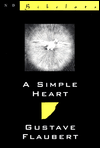
A Simple Heart
By Gustave Flaubert
In this short work, the author of Madame Bovary tells the story of a woman with an enormous capacity for love and a limited life in which to spend it. (Isn't that, in some way, what everyone feels about herself and her own circumstance?) The heroine, Félicité, works as a housekeeper for a middle-class family and adores the two children she helps raise. She loves her nephew immoderately, too, asks little in return for her affections, but life thwarts her anyway—her loved ones die.
The story opens: "For half a century the good ladies of Pont-l'Évêque envied Madame Aubain her servant Félicité." What those women thought they coveted was Félicité's standards and stamina (she bustled day and night) —but what they really wanted was her love. No one works as hard as Félicité out of a sense of duty; she worked for love.
By Gustave Flaubert
In this short work, the author of Madame Bovary tells the story of a woman with an enormous capacity for love and a limited life in which to spend it. (Isn't that, in some way, what everyone feels about herself and her own circumstance?) The heroine, Félicité, works as a housekeeper for a middle-class family and adores the two children she helps raise. She loves her nephew immoderately, too, asks little in return for her affections, but life thwarts her anyway—her loved ones die.
The story opens: "For half a century the good ladies of Pont-l'Évêque envied Madame Aubain her servant Félicité." What those women thought they coveted was Félicité's standards and stamina (she bustled day and night) —but what they really wanted was her love. No one works as hard as Félicité out of a sense of duty; she worked for love.
Family Happiness
By Leo Tolstoy
This novella, by the author of the long, great Russian novels, concerns the evolution of love inside a marriage, a subject as relevant now as it ever was. The minute shifts of feeling chronicled in the relationship between Másha and Sergéy Mikháylych address perpetual questions about the human condition and the possibility of true amorous equality, as well as the role character plays in the development of romance.
By Leo Tolstoy
This novella, by the author of the long, great Russian novels, concerns the evolution of love inside a marriage, a subject as relevant now as it ever was. The minute shifts of feeling chronicled in the relationship between Másha and Sergéy Mikháylych address perpetual questions about the human condition and the possibility of true amorous equality, as well as the role character plays in the development of romance.
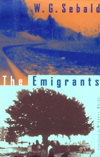
The Emigrants
By W.G. Sebald
Written more than a quarter of a century after Primo Levi's masterworks, W.G. Sebald's The Emigrants also grows out of the great human upheavals of the Second World War. This book—part fiction, part memoir, part scrapbook—evokes the myriad ways the moral apocalypse of World War II still lives on in the greatly altered private lives of the people Sebald loves: artists, school teachers, recluses, solitary scholars, émigrés.
The Emigrants chronicles four men's lives, each who left Germany at different times during the century. Three of them are clearly emigrants, rather than immigrants, in that the substance of their lives was determined more by what they left behind than by what they found. Sebald, who died an untimely death late last year in an automobile accident, not far from his adopted home in Norwich, England, wrote meticulously detailed, meandering investigations into the soul. He was fascinated by the nature of memory—its dormancies and recoveries. His books put the reader inside life-size mazes in which the center is also the only way out. The reader searches for the root of an obsession, the beginning of a sorrow, which in a psychological sense, leads us to the core of the problem and also to its end.
By W.G. Sebald
Written more than a quarter of a century after Primo Levi's masterworks, W.G. Sebald's The Emigrants also grows out of the great human upheavals of the Second World War. This book—part fiction, part memoir, part scrapbook—evokes the myriad ways the moral apocalypse of World War II still lives on in the greatly altered private lives of the people Sebald loves: artists, school teachers, recluses, solitary scholars, émigrés.
The Emigrants chronicles four men's lives, each who left Germany at different times during the century. Three of them are clearly emigrants, rather than immigrants, in that the substance of their lives was determined more by what they left behind than by what they found. Sebald, who died an untimely death late last year in an automobile accident, not far from his adopted home in Norwich, England, wrote meticulously detailed, meandering investigations into the soul. He was fascinated by the nature of memory—its dormancies and recoveries. His books put the reader inside life-size mazes in which the center is also the only way out. The reader searches for the root of an obsession, the beginning of a sorrow, which in a psychological sense, leads us to the core of the problem and also to its end.
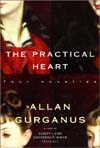
The Practical Heart
By Allan Gurganus
Gurganus is a storyteller in the grand style. This full collection is his most important book so far, a collection of four novellas, each allegorical and starkly modern at once. In Saint Monster, a young boy interrupts his mother and her lover in an amorous session on the family couch and, in doing so, ends the life of his precarious family as he knew it.
We slowly decipher, as he does, secrets about his father, a legendarily ugly-looking and kind man—and are forced to ponder what ugliness is. Gurganus's tales are contemporary moral fables, about the importance of art and that almost-lost ideal, the community.
By Allan Gurganus
Gurganus is a storyteller in the grand style. This full collection is his most important book so far, a collection of four novellas, each allegorical and starkly modern at once. In Saint Monster, a young boy interrupts his mother and her lover in an amorous session on the family couch and, in doing so, ends the life of his precarious family as he knew it.
We slowly decipher, as he does, secrets about his father, a legendarily ugly-looking and kind man—and are forced to ponder what ugliness is. Gurganus's tales are contemporary moral fables, about the importance of art and that almost-lost ideal, the community.




